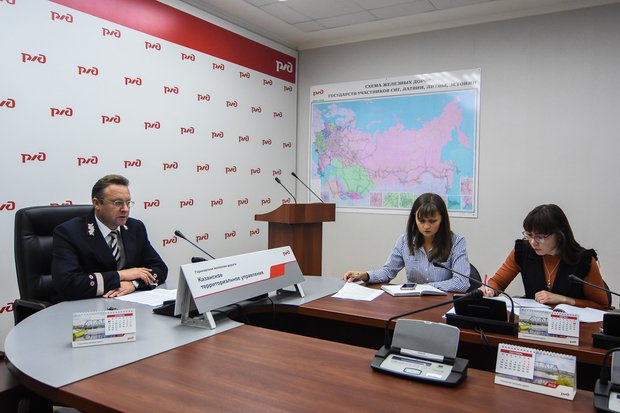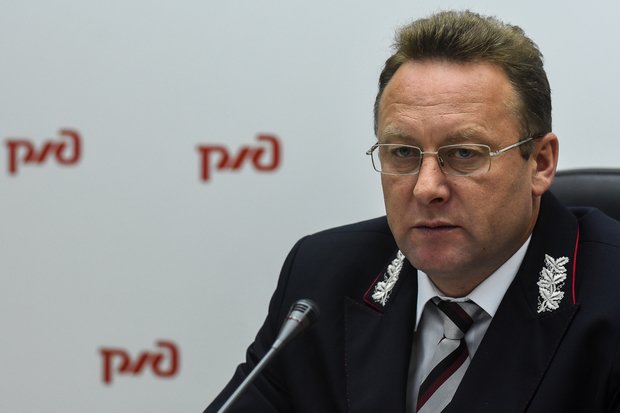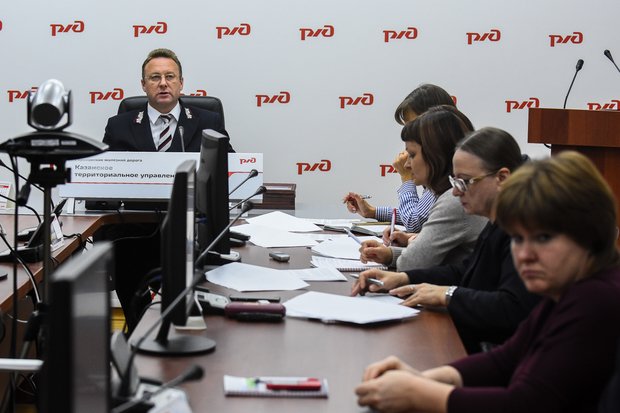Alexander Cheremnov: ''Then, I think, our government will seek funds for the HSR''
Gorky Railway is preparing a transport revolution from Adler to Yekaterinburg, planning to open new destinations from Kazan
Kazan, which is considered a transit railway junction, has obtained the right to launch many direct ''non-Moscow'' trips. On 1 October, Alexander Cheremnov, Deputy Head of the Gorky Railway — the branch of Russian Railways OJSC in the Kazan region, said that with the transition to the winter schedule Russian Railways will reschedule passenger trains, giving the right to form and serve ''the trains from Adler to Yekaterinburg'' with departure from Kazan. Why the High-Speed Railway project is slowed down, how railway workers are preparing for a 12-fold increase in freight traffic in 2025 and how much tariffs will be raised — read in the material of Realnoe Vremya.
15-year anniversary of Russian Railways in Tatarstan: intermodal branch and Kazan-2 transit station
Russian Railways JSC celebrated not very round, but significant date — 15 years since the foundation of the company, established on the basis of the Ministry of Railways, on 1 October. On this occasion, Alexander Cheremnov, Deputy Head of the Gorky Railway, the branch of Russian Railways JSC in the Kazan region, summed up the results of the work of Russian Railways in Tatarstan at a press conference, making the retrospective of bright historical events since 2005. Just from that moment, every year and without interruption, railway workers were building and opening new infrastructure facilities for the expansion of railway communication in the territory of three neighbouring republics — Tatarstan, Chuvashia and Mordovia. For some reason, Cheremnov did not mention the scale of Russian Railways investments in their renovation and reconstruction, although it is easy to figure out that this is about tens of billions of rubles.
The speaker tried to avoid announcing specific figures, giving only general vague formulations. Nevertheless, it is obvious that over the past 15 years, Russian Railways have made a big leap in the modernization of the railway infrastructure for passenger and suburban transportation. Suffice it to say that one of the most capital-intensive projects of Russian Railways in Tatarstan has been the construction of an intermodal branch in its capital, connecting the central station and the airport. Kazan has become a point of attraction for Russian Railways investments after it won the right to host 2013 Universiade. Alexander Cheremnov reminded that Russian Railways and the government of Tatarstan signed an agreement on cooperation in the field of railway transportation for 2011-2013 in 2010, after which Russian Railways forced its long-term construction. Thus, the reconstruction of the Romanovsky bridge across the Volga River, which dragged on since 2005, was completed in 2011, and in 2012, on Railway Worker Day, the transport interchange terminal Kazan-2, which receives transit trains, was opened.
Since then, Kazan fell in the priorities of Russian Railways, but the flow of investments slightly ''dropped'', reorienting to the renewal of the rolling stock. Kazan has become the third city in the Russian Federation that operates two-storey trains (Kazan-Moscow-Kazan), the cars of commuter trains were updated everywhere. As an important event Cheremnov called the construction of the overpass across the railway on the 758th km in Zelenodolsk, where there constantly were traffic jams. Finally, on 22 December 2016, Russian Railways and Tatarstan signed another cooperation agreement, but its content was not commented by the deputy head of the Gorky Railway in the Kazan region.

''If the economy requires it, the tariffs will be raised''
''We have grown significantly in terms of passenger transportation. Especially to the suburbs, due to which we received offers to open new routes. You can see that the quality of our commuter cars is excellent. This programme has not stopped, the renewal of rolling stock will continue,'' assured Cheremnov.
Answering the question of Realnoe Vremya whether tariffs will be changed, he reported that in the suburban transportation they definitely will not be raised until the end of the year, but he has no information for long-distance trains yet. ''I cannot guarantee that tariffs won't be raised for long-distance passenger transportation. This will depend on economic conditions. If the economy requires it, it means there will be an increase,'' Cheremnov explained.
Journalists asked the speaker if there was any fresh news on the megaproject of Russian Railways — the construction of the Moscow-Kazan high-speed railway (HSR). The head of the Kazan branch of Russian Railways had no choice but to repeat the already known information, making it clear that there are no positive changes yet and it is difficult to predict the future of the construction of the HSR to Kazan.
''As you know, it is a state project. The source of financing has been defined only for the first part — from Moscow to Vladimir,'' he reminded. ''Although, as I have already said, the project has passed state expertise in all stages of the construction from Moscow to Kazan. But the money has been allocated only for the first stage.''
At the same time, Cheremnov expressed hope that ''in our lifetime'' the project will be implemented, although he is not going to ''offer rosy hopes''. ''Then, I think, the leadership of our country will seek funds that are necessary for the implementation of the project. The project is not cheap, the amount is known. Therefore, everything depends on the sources and joint financing models with both Chinese and other partners, and on the approaches of new investors. As soon as the financing scheme is determined, the project will be implemented. The stage of design work and the choice of the route have been completed, all that is left to do is to finance and implement,'' he said, which meant that the most important thing is yet to be done.

I cannot guarantee that tariffs won't be raised for long-distance passenger transportation. This will depend on economic conditions. If the economy requires it, it means there will be an increase
Quiet transport revolution
After that, journalists had no choice but to return to the topic of passenger transportation. Will new directions be opened through Kazan? — answering this question, the head of the Kazan branch of the Gorky Railway tried to dissuade the press and move this topic to the next meeting, so as not to confuse ''fresh with sour''.
''There will be new proposals, new trains, but we will tell about them a week before the winter schedule. There are new trains that will function additionally,'' he tried to keep the intrigue, but still succumbed to persuasion and revealed some details of the new schedule (apparently, it has not yet been approved — editor's note). ''We take on maintaining of all trains from Adler to Yekaterinburg. It will be trains of our formation. Besides, we will be responsible for the 25th train Izhevsk-Moscow (one of the most popular because of the early arrival time to Moscow – editor's note). The new schedule has a lot of interesting things, but let's wait. A week before the new schedule we will tell about all changes,'' Cheremnov assured.
7 days to China
RZD is proud of the growth of cargo transportation. According to the speaker, over 15 years the turnover of the company has increased fivefold, and over 9 months of this year the Kazan branch has shipped 4,2 million tonnes of cargo (or a fifth of the total freight traffic generated by the Gorky Railway). And there is more to come, he said. ''We expect that the turnover will grow not 5-6-fold, but 12-fold by 2025,'' Cheremnov surprised the journalists.
According to him, it is China that will provide the explosive growth. The head of the Kazan branch informed that this year Russian Railways has adopted a programme of updating the infrastructure until 2025, which includes destinations to China. ''I cannot tell yet what share will go through our region, I'm afraid to make a mistake. But we expect a growth,'' he said evasively. According to Cheremnov, no train to China has been formed yet, though there are exporters. ''We form their cargo to China for trains that are formed in Moscow, and pick up these cars. Due to this, the speed of delivery of goods on the route Moscow-Blagoveshchensk has been reduced from 28 to 7 days,'' he said.

Single-line railway is killing the turnover from Alabuga
One of the vulnerable points in the relations between the Russian Railways and the government of Tatarstan is the long-standing problem of limited railway capacity at the SEZ Alabuga, the head of the Kazan branch admitted. Let us remind that the Turkish residents of the SEZ at the time already complained to the president of Tatarstan that they could not send products without a long wait, as goods from Alabuga are delivered by single-line railway. Alexander Cheremnov said that the inclusion of this issue in the programme of updating the infrastructure of Russian Railways until 2025 is now being under consideration.